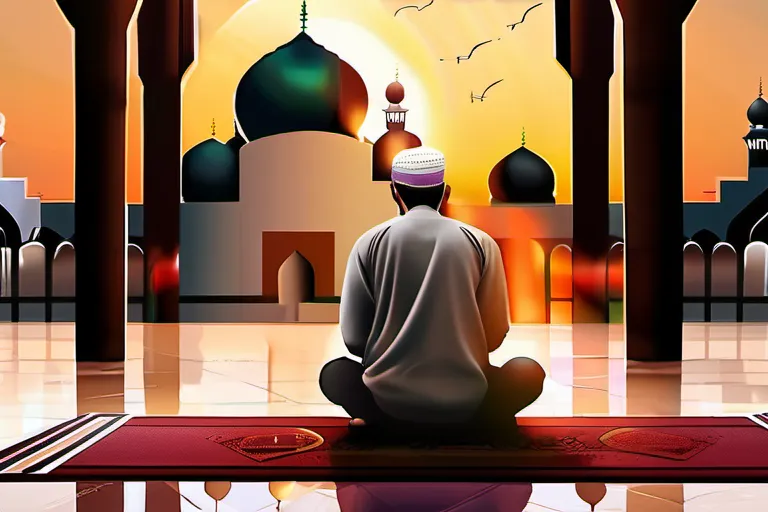Explore the significance, steps, and benefits of Salah in Islamic worship.
Salah is a fundamental pillar of Islam, a direct connection between Muslims and their Creator. In this article, we delve into the meaning, importance, and steps of performing Salah, as well as its numerous benefits for the individual and society.
The Significance of Salah in Islam
The significance of Salah in Islam cannot be overstated—it’s like the cornerstone of one’s spiritual edifice, supporting the entire structure of faith and practice. Imagine praying as a bridge between you and God; every step you take in Salah is like crossing that bridge, bringing you closer to the divine.
Salah serves as a pillar of Islam, emphasizing the importance of regular worship and maintaining a constant connection with the Almighty. It’s not just about reciting verses; it’s an act of submission, a form of communication where you pour your heart out to God. How often have we wished for a way to directly connect with our Creator? Salah provides that opportunity.
The rewards of regular Salah are immense. It’s like planting seeds in fertile soil; the more you water them, the bigger and stronger they grow. The Prophet Muhammad (peace be upon him) said, ‘Between a person and the next world is his deed,’ and Salah is that deed that can lead to paradise. Can you imagine spending eternity with your Lord because of your consistent worship? That’s the promise offered by regular Salah.
Moreover, Salah teaches discipline and mindfulness. It instills in us the habit of waking up early and staying late, making time for God even amidst busy schedules. Imagine the world as a giant race track; Salah is that checkpoint where you pause to reflect and renew your commitment to righteousness. How can we ignore such an essential practice?
Lastly, Salah unites Muslims globally, turning them into one community of believers. It’s like holding hands in a circle, each person praying their own way but united under the same moon. The act of performing Salah together in congregation is a beautiful demonstration of brotherhood and sisterhood.
So, why not embrace this divine gift? Why wait for something that can change your life forever when you have it right now? Salah offers a profound experience, a chance to taste the sweetness of spirituality. Will you take the first step?
The Steps of Performing Salah
Now that we have explored the profound significance of Salah in Islam, let’s dive into how you can perform this sacred ritual step-by-step. Salah is not just a series of movements and recitations; it’s a bridge between the heart and the divine. Imagine standing before the Almighty, each posture and every word a step closer to Him. How do we begin?
The first component of Salah is standing (Qiyam). Picture yourself standing upright, feet shoulder-width apart, palms facing down. This position symbolizes your readiness and willingness to connect with Allah. Can you feel the ground beneath your feet, grounding you in the present moment? How does this posture make you feel?
Next comes Ruku. It’s a bow that symbolizes humbleness before the Creator. As you bend forward at the waist, hands resting on your knees, imagine a metaphorical veil lifting, allowing light to pour into your heart. What do you visualize during this moment of submission?
Sajdah is perhaps the most physically demanding and spiritually rewarding part of Salah. Kneeling down, forehead touching the ground, you prostrate before Allah. This position symbolizes complete submission. Can you feel the weight of your soul resting on the earth as you humbly submit to the will of your Lord?
And finally, standing up for Tashahhud. Here, you acknowledge that there is no god but Allah and Muhammad is His messenger. This act encapsulates a moment of gratitude and reflection. How do you feel when you recite this phrase, expressing your faith and devotion?
The verbal components of Salah are equally important. Reciting the Fatiha during every unit of prayer is like opening a book to the first page – it sets the tone for what follows. Each word carries its own weight, resonating with your soul. How does reciting these verses make you feel?
By understanding and practicing these steps, Salah becomes more than just a ritual; it transforms into a personal journey of spiritual growth and connection. So, as you prepare to perform Salah, reflect on the significance of each movement and word – may this journey bring you closer to Allah.
The Benefits of Salah for Individuals
Imagine Salah as a bridge connecting your soul to the divine presence of Allah. How often do we feel overwhelmed by life’s pressures, wondering how to find that inner peace? Salah provides more than just spiritual nourishment; it’s a holistic practice that can significantly improve our mental and emotional well-being. Just like a tree needs sunlight and water to thrive, our minds need moments of quiet reflection to grow stronger.
Performing Salah regularly can be likened to tending to a garden. Each time you step into prayer, you’re nurturing your spiritual soil, making it fertile for the seeds of faith to sprout and flourish. This practice helps in cultivating patience, discipline, and resilience—qualities that are crucial in navigating life’s challenges.
Moreover, Salah fosters a sense of tranquility that can be hard to find in our fast-paced world. It’s like taking a momentary pause from the chaos around us to center ourselves. By focusing on recitations and postures, we allow our minds to rest, reducing stress and anxiety. Isn’t it true that we all seek moments where we feel calm and at peace?
But Salah isn’t just about individual well-being; it’s also a profound act of communication with Allah. Each time you bow or prostrate, you are expressing your submission and gratitude. This connection can be incredibly empowering, reminding us of our purpose and the divine guidance that guides us every step of the way.
So, why not make Salah a regular part of your day? Embrace it as a cherished ritual that brings you closer to Allah and enhances your overall quality of life. Just like tending to a garden, Salah requires consistent effort but yields abundant rewards in terms of mental and emotional health.
The Benefits of Salah for Society
Understanding Salah in Islam: A Comprehensive Guide
The Benefits of Salah for Society: Explore the social benefits of Salah, including its role in promoting unity, fostering a sense of community, and contributing to peace and stability.
Salah: A Beacon of Unity in Diversity
Imagine a vast garden where people from different walks of life gather under the same sky. Each person brings their unique hue, yet they all bow together in prayer. This vivid scene symbolizes the power of Salah. By performing Salah five times a day, Muslims across the globe unite in a shared act of devotion, transcending cultural and linguistic barriers.
Fostering Community Through Common Praise
Do you ever wonder how a community can come together despite their differences? Salah provides the answer. Every Friday, congregational prayers bring people from diverse backgrounds to a common place, creating an atmosphere of shared purpose and mutual respect. This collective worship not only strengthens individual faith but also builds bridges between neighbors, encouraging social cohesion.
Stability Through Regular Rituals
Think about how a regular routine can bring order to chaos. Salah acts like the heartbeat that keeps society steady. By establishing a daily rhythm of prayer, Muslims contribute to a sense of stability and predictability in their community. This consistent practice helps individuals maintain their spiritual equilibrium, which in turn fosters a more harmonious and peaceful society.
Conclusion
As we reflect on the role of Salah in society, it becomes clear that this divine obligation goes beyond individual benefits. It serves as a unifying force, a reminder of our shared humanity, and a cornerstone for building a stable and harmonious community. So, next time you perform your Namaz, consider not just its personal significance but also the broader impact it has on those around you.
Common Misconceptions About Salah
Have you ever wondered why Salah, or prayer, holds such a significant place in Islam? Is it just about fulfilling a religious duty, or does it serve a deeper purpose? Could it be that Salah is more than just a set of movements and words, but a means to connect with the divine and find inner peace?
One common misconception is that performing Salah is too time-consuming. Is it really as daunting as it seems? Consider the daily routine of Muslims around the world: they start their day with Fajr, offer Dhuhr, Ashar, and Maghrib throughout the day, and end the night with Isha. For many, it becomes a natural part of their daily life, almost like brushing teeth or having meals. The key is consistency and commitment rather than lengthy sessions.
Another misconception is that Salah is too difficult to perform correctly. It’s true that there are specific steps involved, but don’t let this deter you. Think of it as learning a new language or mastering a musical instrument. With practice and patience, the motions become second nature. Start with Iqama and focus on the essential parts first—prostration (Sujood) is often seen as the essence of Salah.
The idea that Salah is only for those who are perfect or knowledgeable can be discouraging. But remember, Allah accepts sincere repentance and intentions from His servants. Even small steps count; a single prayer with genuine intention brings closer the hearts to Him. So, don’t hesitate to start, knowing that every step taken towards Salah is valuable.
In summary, Salah is not just about following rituals but also about building a strong connection with the Creator and nurturing one’s spirituality. It’s an opportunity to reflect on personal growth and seek guidance from the divine. By dispelling these misconceptions, we can appreciate the profound impact of Salah in our lives and embrace it as a precious part of our daily journey.
Tips for Improving Your Salah
Improving your Salah can be like polishing a mirror to ensure it reflects its full beauty and clarity. Have you ever wondered why some people seem more engaged during prayer, their focus unwavering? It’s all about maintaining concentration. To enhance your Salah, start by ensuring a quiet environment where distractions are minimal. Can you imagine trying to solve a complex puzzle in a noisy room? It’s much harder than in a peaceful setting.
Another key is performing Salah with sincerity. Think of it like pouring your heart into a cup—a full heart will make the vessel overflow, just as sincere worship fills your Salah with divine blessings. Remember, ‘The prayer of a servant is better than his worldly concerns.’ So, when you stand to pray, let your intentions be pure and your focus unwavering.
To stay on track during Salah, it’s helpful to have a teacher or mentor who can guide you. Just as a master painter shows their apprentice the finer points of technique, a knowledgeable individual can help refine your posture, recitations, and overall performance. Seek out someone experienced in the practice; their guidance can be invaluable.
Lastly, embrace Salah as a dialogue with Allah. Engage with each verse, reflecting on its message before reciting it. This not only makes your worship more meaningful but also deepens your spiritual connection. Imagine having a conversation with a long-lost friend—wouldn’t you want to listen carefully and respond thoughtfully? Similarly, in Salah, let your responses be mindful and heartfelt.
By integrating these tips into your prayer routine, you’ll find yourself not only improving the quality of your Salah but also deepening your spiritual journey. Isn’t it time you gave your Salah the attention it deserves?
Conclusion
 By understanding the significance and proper performance of Salah, Muslims can deepen their faith and draw closer to Allah. Regular practice of Salah is a powerful tool for personal growth and spiritual development.
By understanding the significance and proper performance of Salah, Muslims can deepen their faith and draw closer to Allah. Regular practice of Salah is a powerful tool for personal growth and spiritual development.











